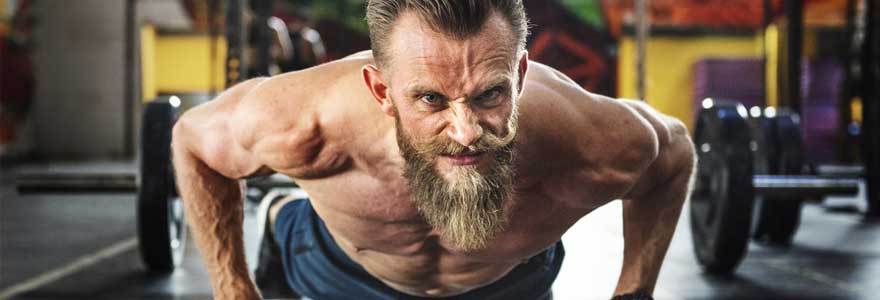
Bodybuilding is the sport of developing muscle fibers through the combination of weight training, increased caloric intake, and rest. Competitive bodybuilders display their physiques to a panel of judges, who assign points.
Although initially a male-only pursuit, in the 1980s women started to compete in separate competitions, but as of 2004, women’s bodybuilding has greatly waned in popularity.
The sport is not to be confused with strongman competition, or powerlifting, where emphasis is on actual physical strength or with Olympic weightlifting where emphasis is equally split between strength and technique. Although superficially similar to the casual observer, the fields entail a different regimen of training, diet and basic motivation. Instead, bodybuilders aspire to the development and maintenance of an aesthetically pleasant (by bodybuilding standards) and balanced physique. In bodybuilding, size and shape are far more important than how much one can lift.
Strategy
In order to achieve muscle growth (hypertrophy), bodybuilders focus in three main lines of action:
Resistance weight training
Good nutrition incorporating extra protein and supplements where necessary
High quality rest to facilitate growth
Resistance weight training
Resistance weight training causes microtears to the muscles being trained; this is generally known as microtrauma. These microtears in the muscle contribute to the soreness felt after exercise, called Delayed Onset Muscle Soreness, or DOMS. It is the repair to these microtrauma that result in muscle growth (anabolism). Normally, this soreness becomes most apparent a day or two after a workout.
Nutrition
The growth and repair however cannot occur without the necessary building blocks. These are supplied by high quality nutrition. Bodybuilders require a very specialised diet. Generally speaking bodybuilders require anything between 500-1000 calories (2000 to 4000 kilojoules) above their maintenance level of food energy whilst attempting to increase lean body mass. A sub-maintenance level of food energy is combined with cardiovascular exercise to lose body fat in preparation for a contest. The ratios of food energy from carbohydrates, proteins and fats vary depending on the goals of the bodybuilder.
Bodybuilders split their food intake for the day into 5-7 meals of roughly equal nutrional content and attempt to eat at regular intervals. This interval is normally between 2-3 hours. The reason for this is to allow greater absorption of nutrients, and to increase basal metabolic rate. This process is also valuable for those wishing merely to lose fat.
Carbohydrates
Having a large proportion of food energy come from carbohydrates is so that the body has enough energy to deal with the rigours of training and recovery. Bodybuilders require complex carbohydrates as they release energy more slowly than simple sugars. This is important as simple sugars cause an insulin response which places the body in a state where it is likely to store additional food energy as fat rather than muscle, furthermore frequent consumption of simple sugars can lead to Type II diabetes and the insulin response can waste energy that should be going towards muscle growth. However bodybuilders do ingest some simple sugars post-workout to replenish glycogen stores within the muscle.
Protein
It is recommended that bodybuilders receive 1 to 2 grams of protein per pound of bodyweight to help the body recover and build. These protein sources should be of a high biological value such as steak, chicken, fish, soy, milk or whey, and egg whites. Chicken, whey, and egg whites are often preferred due to their relatively low fat content. Some bodybuilders prefer to get their daily protein requirement from foods first and then from supplementary protein powders.
Vitamins & Minerals
Adequate intake of vitamins and minerals is necessary; Bodybuilders almost universally take a multi vitamin each day. Essential fatty acids (including omega-3s), which the body can not synthesize, are also consumed. As with all supplements, it is preferable to get the vitamin and mineral requirement from whole foods, but not always convenient.
Supplements
Supplements can help muscle gain, although some are unproven and many are ineffective. Creatine however, is one which has been proven to help bodybuilders. Although creatine only helps if used in conjunction with a solid nutritional base and weight training program, this is true for all supplements.
Some bodybuilders may use drugs to gain an advantage over results due to natural hypertrophy, especially in professional competitions. Although many of these substances are illegal in many countries, in professional bodybuilding the use of anabolic steroids and precursor substances such as prohormones are essential to competing in world-class competitions. Most steroids allows the human body to be in a more anabolic state. Significant negative side-effects accompany steroid abuse, such as liver damage as well as negative feedback leading to a decline in the body’s own testosterone production, which can cause testicular atrophy and possible infertility.
In recent years the trend has moved from the use of anabolic steroids in pro-bodybuilding and toward HGH or GH, which stands for human growth hormone. HGH is believed to have fewer side effects than anabolic steroids. It is very expensive to buy and there are a large number of fake products available on the black market.
Rest
The third component to extraordinary muscle building is rest. Without quality rest and sleep the body does not have an opportunity to recover and build. About eight hours of sleep a night is essential for the bodybuilder to be refreshed and ready for the next session. Additionally, many athletes find a daytime nap further increases their body’s ability to direct resources toward repairing and building; sleep is good.